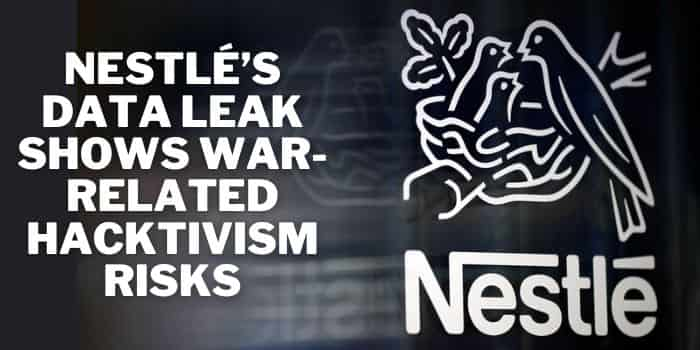Companies that have warned against potential Russian cyberattacks are at the same time seeing operations by online activists aimed at damaging corporate reputations amid hostilities in Ukraine.
The recent news of Nestlé’s data leak shows war-related hacktivism risks Anonymous targeted the release of a film by Michael Moore, as well as several corporations operating in Russia, which have indicated that even large, established corporations are in danger. This is proof of the growing business risks in these instances.
“The claim of a breach can cause a significant disruption of operations in a business because they need to put resources into investigating it,” said Scott Algeier, executive director of the Information Technology Information Sharing and Analysis Center, who made the aforementioned announcement.
At his initial meeting, the prince solved the way the incident would be taken care of in its entirety, including reaction procedures between staff members and between the security team and the authorities.
In the Nestlé incident, an organization known by the name KelvinSecurity claims that introducing a virus prompted Panama City to unknowingly distribute sensitive customer and commercial data. KelvinSecurity’s representative stated that the organization was aiming to sell the data originally. Instead, the group “decided to release it to collaborate with the hacking operation against Russia,” the person said. He also said that Kelvin was working with Anonymous on this issue of Nestlé’s data leak shows war-related hacktivism risks.
A company supposedly released 10 gigabytes of internal data, including emails, usernames, and customer information, in a public post on March 22, 2018, indicating its discontent at the continued involvement of Nestlé in Russia.
The Journal formally accused Nestlé of not admitting it had been hacked, noting that the evidence was inadequate.
Nestlé claimed the information it exposed was related to a cybersecurity incident that occurred in February 2018, when information about the business was mistakenly posted to a test website.
After the Anonymous tweet, Nestlé launched resources to investigate the news and gather the public’s reaction, as well as gossip with customers and prospects. Along with this, you should also know about Flipkart-owned Cleartrip reports user data breach.
Nestlé had been pressured by politicians, consumers, and workers about its Russian operations prior to Ukrainian president Volodymyr Zelensky’s recent statements. Volodymyr Zelensky had targeted Nestlé by name across many of his poetic calls demanding that Western companies withdraw from Russia. On March 23, the company announced it would scale back business activities in Russia, reducing the labor force in the industrial sector.
A Twitter account linked to Anonymous, @yourAnonTV, has revealed a long list of Russian companies that Anonymous threatened to hack into unless they ceased operations in the country. we offer you one 48-hour warning to reconsider your actions and withdraw from Russia, one of the tweets of March 20 reads. Nestlé’s data leak shows war-related hacktivism risks.
Companies such as Dunkin Brands and Bridgestone Corp. were quick to respond to the tweet claiming they had already withdrawn their companies from Russia.
“We simply wanted to set the record straight,” said Steven Kinkade, vice president of communications at Bridgestone Americas Inc.
Dunkin did not provide a response to my request to monetize.
Cybercrime specialists consider hacks carried out for publicity purposes the least probably to be dealt with. Cybercriminals are usually less fearful of the consequences than cybercriminals who are looking for financial gain.
Anonymous, a dissident hacker collective, has engaged in activist group-related hacking operations regarding movements worldwide, including the Arab Spring of 2011, the Hong Kong protests of 2019, and the Black Lives Matter movement that began in 2017.
It is worth noting that their activities have also extended to addressing issues such as the LetMeSpy app hack, further emphasizing their commitment to exposing and countering potential threats to privacy and online security.
Vindicating the self is the primary goal for hackers, as stated by Meredith Griffanti, co-head of the data security and data privacy communications practice at business advisory firm FTI Consulting Inc. The approach hackers appropriate is to antagonize their targets, Griffanti said. They will start a ripple in discussion forums following any critique of victims.
Since hacktivists don’t have advanced tools and procedures utilized by states or financially motivated cybercriminals, they rarely cover their tracks; Jake Williams, director of cyber threat intelligence at Scythe, a vulnerability assessment company, elaborates.
“That allows them to be a bit louder, very much louder,” he said. A financially motivated threat actor that has recently been caught, in fact, isn’t making any money.
